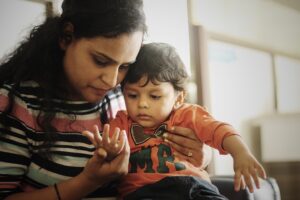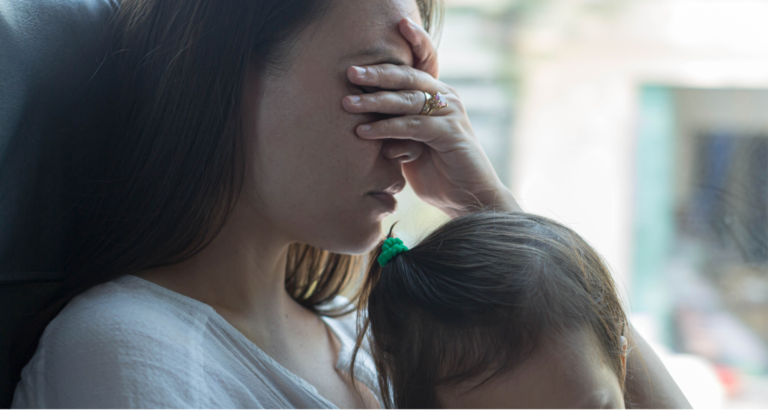Q: This will be the first holiday my child will have where we will be separated as a family. How do we tell them?
Ava: Depending on the age of your child this conversation can look differently but a couple of good rules I try to remember with my children for any “bad” or “sad” news is:
1. Being honest about facts, plans and giving them as much clarity about what to expect as possible.
2. Making space for their emotions and empathizing with your child.
3. Giving them space and support.
4. And most importantly, being human and soft without emotionally dumping on your child or venting on them.
This is particularly important for us Middle Eastern parents who may have grown up with parents who overshared. Make sure you get all your support from other grown ups. Do not rely on your children even older teens to get you through the holiday season.
It’s normal to experience shame, embarrassment or even feel guilt about “burdening” others by talking about what you’re going through during this time. Most consenting adults who want to be there for you will be delighted to offer you warmth, guidance and support and will not make you feel bad for sharing.
Also, it’s important to make sure all other important grown ups around your child are aware of what you have told them to avoid awkward questions that the child may not have any answers to. For example, let other important adults in your child’s life such as friends’ parents and teachers know that for example the plan this year is that your child will spend Eid with mom and that dad will be traveling.
Informing important people in your child’s life can alleviate the pressure from younger children from having to describe their circumstances. It can also help the class teacher or tutor incorporate diverse family stories that exist around the world. Your child will learn that many families such as separated families, single parent families, or blended families celebrate in a variety of ways and that they are not alone.
Only if you have a good relationship with the other parent, you can tell your child about your plans together, otherwise it may be better to tell them separately. Try your best to have the same story and refrain from blaming the other parent for spending the holidays separately no matter what the story is.
It is enough for children to have to adjust to a new lifestyle, so it’s best not to overwhelm them by emotionally charging it. You can say, “we decided that the plan is to…” and then ask the children to express how they feel about the plans and empathize. You can also remind them that it is only for a brief period of time and that even if it’s not the perfect way to spend the holidays, it is only a temporary time period.
Q: How do we decide where our child will be over the festive season?
Matleena: How you and your ex decide to divide your time with your child is a decision where there are no right or wrong answers. You can come up with a plan that is unique to your circumstances.
I encourage you to first think what you would like the festive season to look like and ask your ex to do the same. Then, sit down together and compare your proposals. Tell your ex what is important to you and ask them to tell you what is important to them. What do you agree on? Can you find options that take into consideration what matters most to both of you? You will need to be flexible in order to get something that is important to you. Your ex will need to do the same.
Before you make the final arrangements, slow down. Think about your plan from your child’s perspective. What are the holidays going to be like for them if you implement your plan? Is it a plan that works for adults but not for a child?
If your child is over ten, consider asking them for input. You may ask for input from a younger child as well if you feel that they are mature enough. Help your child understand that you will not necessarily give them what they ask for, but that you would like to get their perspective on how they would like to spend the holiday season.
You are unlikely to reach an agreement that is perfect, or even good enough. Aim for a plan that you can both live with and meets your child’s needs. You may need to let go of some of your hopes and expectations for the benefit of your child.
If you and your ex are not able to come to an agreement on how you can spend this festive season, you may wish to consider discussing this matter in mediation where the mediator will facilitate the discussion between the two of you. A mediator is a qualified professional who has training in facilitating such discussions in an ethically, culturally and legally sensitive way.
Q: I am worried about how my child will react to our separation. Are there any coping methods I can use to help them?
Matleena: It is wonderful that during this difficult time in your life, you are able to keep your child and their wellbeing in your mind.
Depending on your child’s age, gender and personality, they will be reacting to changes brought about by separation and divorce in different ways. Other influencing factors are, for example, how volatile the marriage or relationship was, how you and your ex are coping, whether or not your child has access to both parents and, how many changes your child needs to adjust to and how quickly the changes take place.
It is easier for a child to adjust to a breakup if everything else in their life remains the same. Your child will have enough to process with the separation alone. If you are asking them to also adjust to a parent’s new partner, moving home and a change in the family’s financial circumstances, you are asking a lot of them.
Try and minimize the number of changes in your child’s life and give them time to prepare for the change.
Young children will not be able to express their confusion, sadness or anxieties in words. They may become more clingy, cry more, show aggression or disobedience and they may have sleep difficulties or complain of stomach aches. You may need to spend more time with them than before, especially if they don’t see their other parent as much as before. You can also help them by maintaining familiar daily routines. Reassure your child that they are not at fault.
Primary school aged children may start acting younger than they are, while others may act older. It is normal for a child to cry, feel guilty or disloyal. Some will act like everything is ok, others take sides. Your child will need a lot of reassurance and comfort. Create time and space for you to discuss with your child the changes in their life and the feelings that they are feeling as a result of the breakup. Encourage your child to continue with their activities and hobbies and spend time with their friends. It is important that they get a break from sadness and grief.
Teenagers may show similar reactions as younger children. Your teenager may also avoid acknowledging their pain by distracting themselves with gaming or spending a lot of time with friends. They may express strong emotions, such as anger. They may also be supportive towards you. Just as with younger children, let your teen know that they can talk to you about anything that is on their mind. Make sure you do not rely on emotional support from your child. Your task is to support them.
It can be quite difficult at times but do your best to remember that your child is not naughty or bad. They are struggling with a big change and doing their best to cope. It is a good idea to let your child’s nursery and school know of the breakup. If you feel that you and the other parent are not able to help your child in this transition, seek help from a school counsellor or child psychologist.
Remember, one of the best ways in which you can help your child is to make sure you have enough mental bandwidth to be supportive, safe and understanding. Look after yourself.
Q: I’m worried about how lonely I will feel without my family during this period. What can I do to make it bearable?
Ava: The impact of separation on the children and the family as a whole is real. You will go through a range of natural emotions such as sadness, grief, even anxiety and anger especially during the festive seasons or other touchstone events. It’s normal to miss your children or just being surrounded by your loved ones. Holiday movies and social media doesn’t help. Also, even if you were the one who initiated the separation it’s possible that there are some good memories and good experiences that all come flooding back causing your heart to ache even more.
It’s good that you are foreseeing how you might feel but be careful not to catastophize or dramatize your experience. Holiday seasons come and go and there are many others around the world going through exactly what you are experiencing. Try to remember that you are not alone and be kind to yourself.
It’s fine balance between normalizing your feeling but not minimizing them, and making space for your feelings without dramatizing them. It’s not an easy ask, I know, but you will find your way through it. Be curious about how you can experiment with taking care of yourself but be prepared that some of the unpleasant feelings may remain. Don’t try to “get rid” of your experience. Imagine yourself six months down the line and how you will tell the story of how you spent this time.
Try to also plan in advance how you will spend this time. Make it an opportunity for self-care. Yes there may be the downside of missing your family but could it be an opportunity to re-energize and rest? With the holiday season also comes the potential of overeating and undersleeping. Maybe this is your chance to make some much needed time for yourself to rejuvenate. Could you take an online course or go to a retreat? Could decluttering, cleaning and recycling of old clothes clear some space for new beginnings?
Endings and transitions are hard and stressful but by being aware of your feelings as normal and planning to make the best of the time, you might actually come through this experience stronger! Allow yourself to be pleasantly surprised.
Matleena Vanhanen is a licensed Counselling Psychologist with over 20 years of experience working in Europe and the Middle East. She has a practice of couples and individual therapy at the MapleTree Center in Dubai.
Dr. Ava Ghasemi (Holdich) is a licensed Psychologist with 11 years experience in the U.S., Canada and the Middle East. She has a practice of individual and couples therapy at the MapleTree Center in Dubai.


















